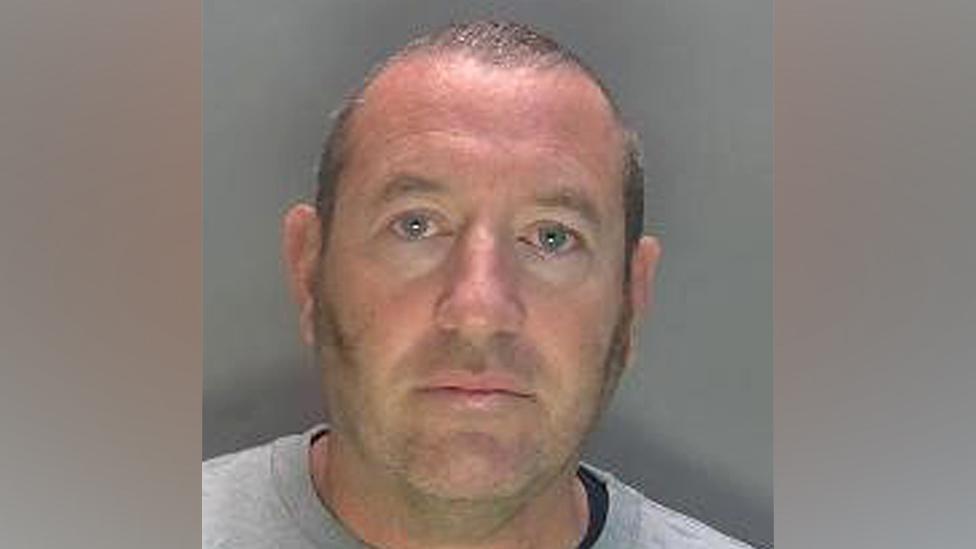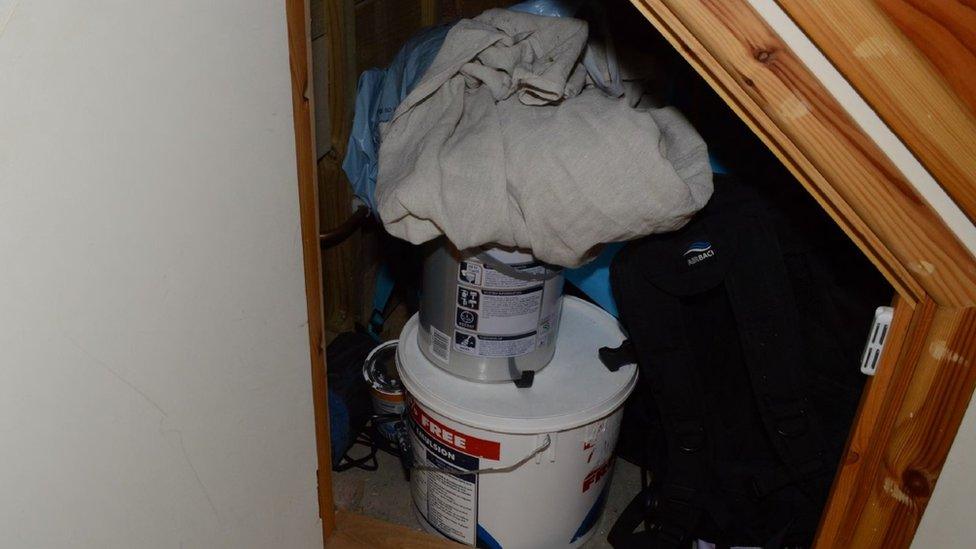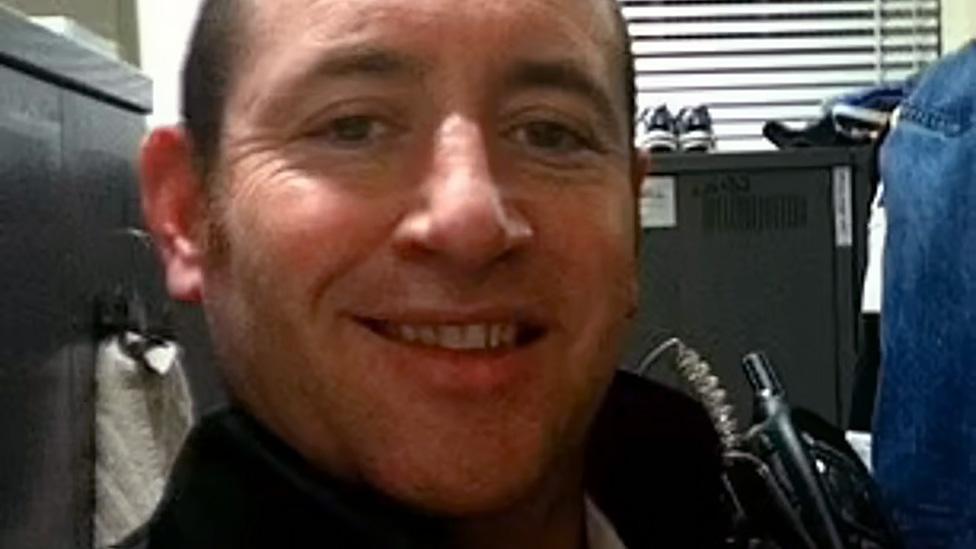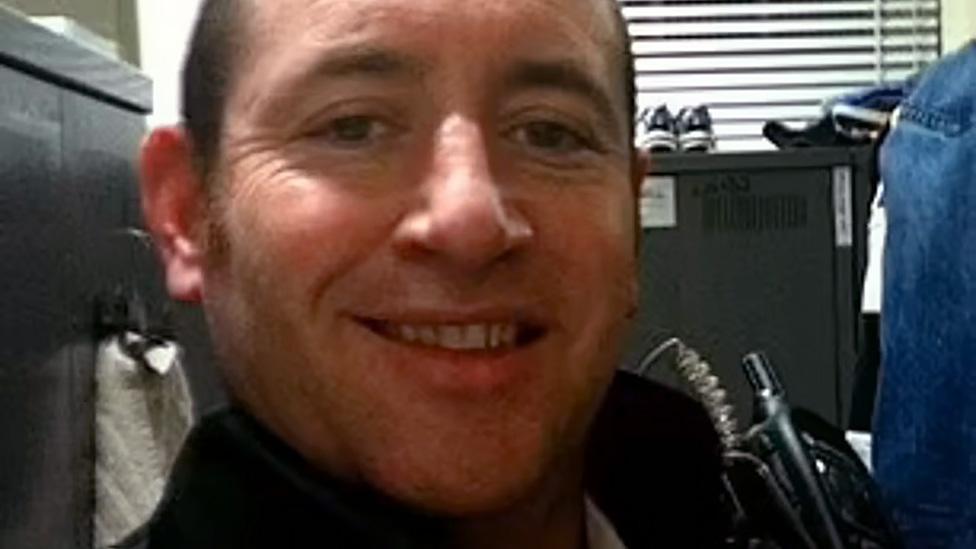David Carrick: Serial rapist Met Police officer in prison at least 30 years
- Published

The home secretary said David Carrick's crimes were a "scar on our police"
Serial rapist and former Metropolitan Police officer David Carrick will serve a minimum of 30 years in jail.
Carrick was told he had taken "monstrous advantage of women" as he was sentenced to 36 life terms.
The 48-year-old committed violent and degrading sexual offences against a dozen women over two decades.
His victims, one of whom had a gun held to her head while being raped and another who was hit with a whip, spoke of how they had "encountered evil".
Flanked by two security guards, Carrick showed no emotion as he was sentenced by Mrs Justice Cheema-Grubb.
"You behaved as if you were untouchable," she told him.
"The malign influence of men like you in positions of power stands in the way of a revolution of women's dignity."
The former police officer used his occupation to "entice victims", said Mrs Justice Cheema-Grubb
The judge also praised the bravery of his victims, some of whom were in the packed courtroom, saying that the voice of courage cannot be denied.
Home Secretary Suella Braverman said Carrick's crimes, carried out from 2003 to 2020, were a "scar on our police".

Carrick falsely imprisoned two women, separately, in the under-stairs cupboard on different occasions
Southwark Crown Court heard he would "use his power and control" to stop victims reporting him, with one stating it was "drilled into" her that he was a police officer.
In statements read out in court, another victim said she felt she had "encountered evil" after being repeatedly raped by Carrick who put a handgun to her head.
Another woman said Carrick hit her with a whip and would shut her in a small cupboard as punishment while "whistling at her as if she was a dog".
Carrick's crimes include dozens of rape and sexual offences, mostly committed in Hertfordshire, where he lived, and all took place while he was a serving officer.
Chief executive of Women's Aid, Farah Nazeer, told the BBC that while the jail term was an "acceptable sentence in a very, very unacceptable situation", she added that it came 17 years, 12 victims and at least 85 offences too late.
Ms Nazeer said the victims' "courage and bravery should be commended and that will send a message to other women in that situation that justice can be achieved".
Mrs Justice Cheema-Grubb said: "These convictions represent a spectacular downfall for a man charged with upholding the law, and empowered to do so even to the extent of being authorised to bear a firearm in the execution of his duty.
"You were bold and, at times, relentless, trusting that no victim would overcome her shame and fear to report you.
"For nearly two decades you were proved right, but now a combination of those 12 women, by coming forward, and your police colleagues, by acting on their evidence, have exposed you and brought you low."
Watch: Footage of David Carrick's arrest released by police
Carrick, who had undertaken a course on domestic violence in 2005, was sacked by the Met the day after he pleaded guilty. The force's Commissioner, Sir Mark Rowley, has apologised for failings and said opportunities to remove him from policing were missed.
He had previously come to the attention of police over nine incidents, including rape allegations, between 2000 and 2021.
Following sentencing, Sir Mark described Carrick's crimes as "unspeakably evil".
"He exploited his position as a police officer in the most disgusting way. He should not have been a police officer," he added.
If you are affected by the issues covered in this article, help and support is available at BBC Action Line
"Behind a public appearance of propriety and trustworthiness you took monstrous advantage of women," the judge said.
Defence barrister, Alisdair Williamson KC, told the court "something has profoundly damaged this man", adding that Carrick "cannot ask for mercy and does not".
Carrick pleaded guilty to 49 charges, including 24 counts of rape.
He was sentenced to a minimum term of 32 years in jail, which he must serve before he can be considered for parole.
Taking into account the time he has already spent in prison on remand, it means he will spend at least another 30 years and 239 days in prison, when he would be in his late 70s.

David Carrick committed many of his crimes in Hertfordshire, where he lived
The court heard Carrick had attempted to take his own life while on remand at Belmarsh prison in south-east London, but was found not to be suffering from any mental disorder.
The judge told him he was driven to try and take his own life "as a self-pitying reaction to the shame brought on you by these proceedings rather than remorse."
Det Insp Iain Moor, from the Bedfordshire, Cambridgeshire and Hertfordshire major crime unit, said detectives had set up a special reporting portal for people to share information about Carrick.
"If anyone else thinks they have been a victim, we still want to hear from you and we will support you," he said.
"As a serving police officer he has brought shame on the profession and was not fit to wear the uniform, but I hope that our determination to get justice for the victims in this case, will go some way to reassuring the public that nobody is above the law and we will bring people like David Carrick to justice."
The home secretary added: "It is vital we uncover how he was able to wear the uniform for so long."

David Carrick held a gun to the head of one of his victims, the court heard
London Mayor Sadiq Khan said: "This should never have been allowed to happen and must never happen again.
"There can be no hiding place for those who abuse their position of trust and authority within the police."
Prime Minister Rishi Sunak's official spokesman said: "This is a shocking and appalling case which demonstrates a vile abuse of power and the public are rightly sickened by it.
"It now is rightly for the police to address the failings in the case and restore public confidence and that's something that the Met Commissioner, we know, is very much seeking to do."
The home secretary has previously said the case would be considered in the inquiry, chaired by Dame Elish Angiolini KC, which was set up to look into the abduction, rape and murder of Sarah Everard by Wayne Couzens, who was another serving Met police officer.
The prosecution in Carrick's case said it fell short of meriting a whole-life order, and Mrs Justice Cheema-Grubb said she agreed, stating: "Of the utmost gravity though this is, the 'wholly exceptional circumstances' test is not met."
Following the sentencing, the Attorney General's Office said it had received "multiple requests" under the unduly lenient sentence scheme, which allows people and authorities to ask for sentences to be reviewed.
It said the case would "of course" be considered for referral to the Court of Appeal. Law officers have 28 days from sentencing to refer a case to the court.
The prime minster's spokesman added that the government was still planning to take steps to strip Carrick of his police pension.

Find BBC News: East of England on Facebook, external, Instagram, external and Twitter, external. If you have a story suggestion email eastofenglandnews@bbc.co.uk
Related topics
- Published7 February 2023

- Published6 February 2023

- Published18 January 2023

- Published17 January 2023

- Published16 January 2023

- Published16 January 2023
